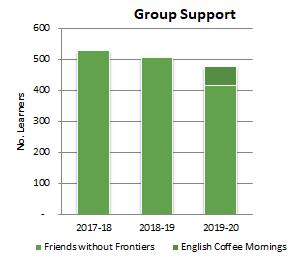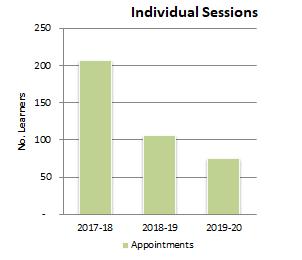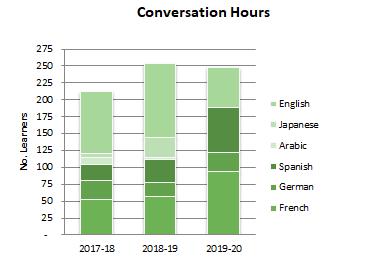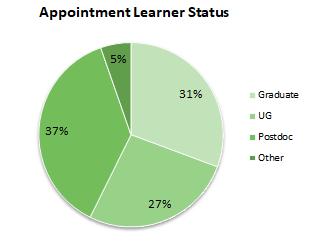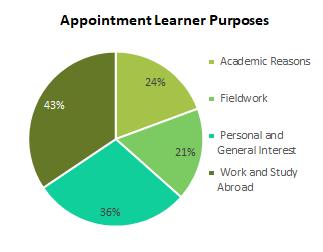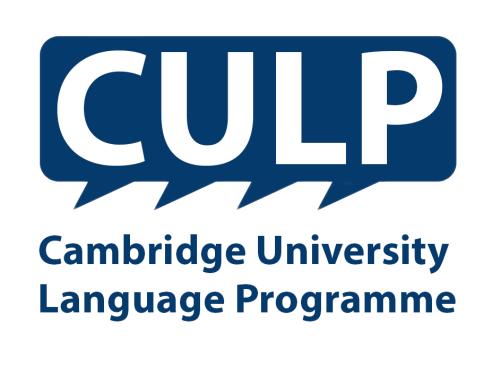
8 minute read
Cambridge University Language Programmes
Specific purposes provision
We delivered Languages for Academic Purposes (LAP) courses in French, German, Italian, Portuguese, Russian and Spanish to graduate students in the School of Arts and Humanities (SAH) and the School of the Humanities and Social Sciences (SHSS). We ran a total of 23 courses in Michaelmas and Lent (and some in Easter too) that enrolled 269 students. We also continued to provide courses as required by a range of MPhil programmes in the Faculties of History and Divinity, and for the centres of Latin-American Studies and African Studies. We also delivered a suite of courses for the Clinical School‘s students.
Advertisement
New languages
We introduced British Sign Language (BSL) for both the general audience and Medics. The course proved to be extremely popular among the Medics.
General
Overall enrolment numbers were up for the year, 1518 (1282). While this is partially due to the increased Easter term figures (more below), the number of enrolments was up even when only Michaelmas/Lent courses are compared. We ran courses leading to externally examined University Awards in French, German, Portuguese, Russian and Spanish. A total of 83 students received the Award.
Easter term remote, online teaching
Upon the Covid-19 lockdown we took a swift decision to deliver all of our courses remotely online. To do so we chose to use Zoom for the delivery of real-time, synchronous teaching and integrated it with the already existing Moodle VLE. CULP has always featured a blended-learning mode of course delivery which meant that nearly all our teaching resources were in digital format and readily available for remote, online delivery and integration with Zoom-based teaching. The next phase consisted of intensive teacher training. We called upon the expertise of the LC Technical section, as well as ADTIS colleagues. Our Teacher Development Coordinator, Pedro Barriuso-Algar, has extensive experience in teaching online (Open University) as does the CULP Director, Dr Radić (University of Auckland, New Zealand). We rolled out a vast number of workshops and organised a supportive professional network that we later extended from the initial training phase into ongoing support. Not expecting to enrol many students, we lowered considerably the fees and looked at this term as an opportunity to gain significant experience.
To our great surprise, interest in CULP courses during lock-down surpassed all our expectations and in Easter and Long Vacation we doubled the number of students from the previous, quite successful year (446 / 255). We did not experience any major technical problems or disruptions and the student feedback was extremely positive. At one point we asked if students would ever consider taking another online language course. We collected 166 responses and 165 of these were positive! This gave us additional impetus and inspiration to approach the 20/21 academic year in a positive and constructive way.
20 years of CULP
The Language Centre started a taught languages programme in 2000 (CULP). The beginnings were humble: two languages, French and German at two levels, beginners and intermediate. The Programme enrolled a couple of hundred students and had half a dozen teachers. From the outset, CULP was designed to deliver blended-learning, technology-enhanced teaching. Today, CULP delivers tuition in 16 languages at up to 6 levels and some 70 different courses including academic purposes (LAP) courses for SAH and SHSS post-graduates, Medics and Musicians. Over the years we have delivered courses for Historians and MBA students too. CULP currently has 35 teaching staff, one administrator and a director. Over the years, we delivered world languages tuition to some 30,000 Cambridge students and staff.
While it was our wish to acknowledge and mark this 20th anniversary in September this year, the circumstances were not favourable as we had to prepare for the online, remote delivery of all our courses. We hope that the new 2021 will be more merciful and allow us to celebrate this achievement with colleagues from around the University.
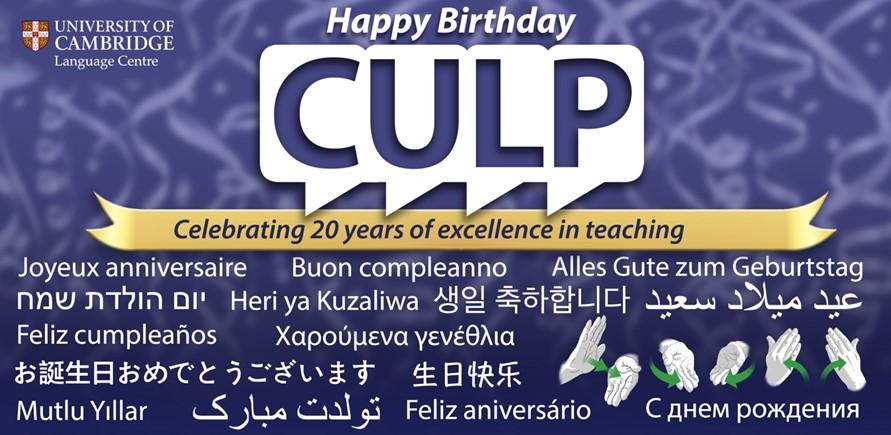
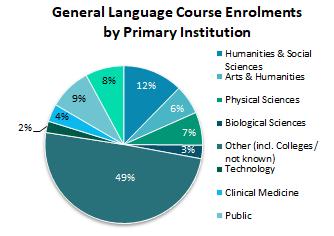
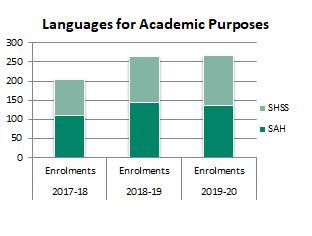
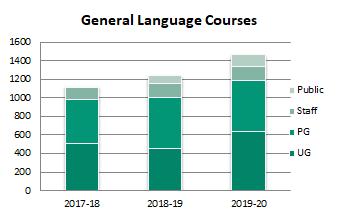
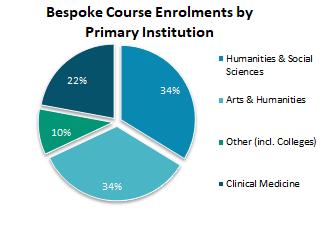
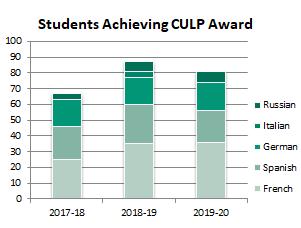
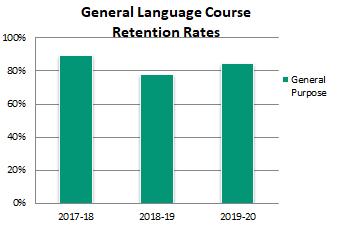

CULP FEEDBACK
“Thank you for offering this cheerful online course. It really helped me to stay positive during the lockdown, the best well-being activity ever.” “I really enjoyed the fact that despite the lockdown, I could still learn constructively on zoom and with the feedback from my teacher. I felt that the pace was good and there was an appropriate amount of homework and content.” “Variety of topics that helped to expand my vocabulary, great resources to self-study and go into more depth. I loved that it was online so I did not have to spend time and energy organising my day to get to the Language Centre.”
“Zoom worked well. Breakout groups broke up the sessions and Kahoot quizzes were a light-hearted way of reinforcing learning and general interest. The materials were excellent. In addition to the materials on the CULP site additional materials were uploaded on One Drive ahead of time which allowed for some preparation and after class review. There was a good mix of materials on culture and history which I found interesting. Grammar tests and essays were helpful to consolidate learning.”
From CULP general language students
“The new Advanced Portuguese course has very interesting content, bringing language-specific content together with cultural topics. It offers a good progression from more general and accessible to more specific and focused topics. This is a good way to cater for the broader audience of this course and make it relevant to the diverse background of students. The standards of the course and quality of the course are very high and commendable… and shows thoughtful consideration of development of linguistic and professional skills alongside awareness of cultural issues relevant to the Lusophone world. Student work and language competency demonstrated that students are achieving high standards. I was particularly impressed with students’ oral competence as shown in their oral presentations.” External Examiner for the CULP Award in Portuguese
“It is very clear in the end of course oral examinations presentation videos that the students have learnt a great deal and benefitted from a very positive experience.” External Examiner for the CULP Award in French
“I would like to congratulate Mr Hoegger / the German team on their excellent work. I particularly appreciated Mr Hoegger’s help and support in view of the fact that this was my first year as an external examiner and also my first ‘Zoom experience’. Equally a big thank you to Mr Agajevs who was always happy to help and very quick to answer any questions I had.”
External Examiner for the CULP Award in German
ADVISING AND SUPPORT FOR INDEPENDENT LANGUAGE LEARNING
New activities in 2019-20
The team devised and implemented events to draw more people in to the John Trim Centre and to stimulate greater peer to peer engagement. A number of themed ‘tea parties’ were organised, where learners were encouraged to give opinions on improving/adding to our services and facilities, and offered out-dated materials to help themselves to. Participants shared experiences of language learning and online resources they have used with each other and the support team.
Additional tea parties included two study abroad workshops to support those applying for Pressland Fund and Trinity College bursary schemes, a fieldworkers advice session and a Chinese-themed event, using green tea and fortune cookies! In total approximately 40 students attended, many of whom had not previously been to the Language Centre, while others were regular users. There are plans to expand this provision in future.
Continuing Activities
In response to the lockdown, all JTC classes and activities adapted and moved online in Easter term, including self-study advising appointments and the Conversation Exchange scheme. Virtual Coffee mornings were organised to help non-native speakers keep up with their spoken English throughout the lock-down period. These proved very popular and were useful in bridging a gap with the English Conversation Hours on hold over Easter term and a lack of English volunteers for Friends without Frontiers. Friends without Frontiers was offered with a smaller number of languages, which is typical in Easter term, but may also have been due to the online element and volunteers preferring the face-to-face aspect.
The French, German and Spanish Conversation Hours made a smooth transition online and fared very well in Easter term, having high enrolment numbers in almost all classes.
Online Promotion
Promotion for the Language Centre has also been carried out virtually. This has meant transitioning from the traditional stall-based, face-to-face events to creating promotional videos, containing all the key information while ensuring they are both engaging and accessible to all.
Two members of the team took the lead in managing this project, which also involved members of the Technical team and the webmaster, creating promotional videos for the University Open Days, Freshers’ Fair and the Postdoctoral events.
There was a considerable amount of work to coordinate from scripting the information, to recording, editing, finding suitable images/screenshots and adding subtitles. This was a new and exciting challenge for the team to take on, enabling them to learn new skills and to collaborate more closely with colleagues across the Centre.
Some of the recorded content has also been transferred to the website, including a video explaining how CULP works and how to enrol.
JTC FEEDBACK
“Thanks a lot for the links and the information—it was really useful.
I will look into these and alternative sources of funding - in case that I don't get the Pressland funding - and reach you if I have any other query.”
PhD student
“These sessions are really enjoyable - thanks again for the opportunity. Will there also be an opportunity to do this programme again/continue teaching in the Lent and Easter terms? Michael, who is quite experienced with German, has said that he feels as though his German speaking is already more coherent than it was before these sessions, which is nice to hear. Catherine is lovely, and we are currently focusing on building up her vocabulary through casual discussions on a wide variety of topics.”
German Friends Without Frontiers volunteer
